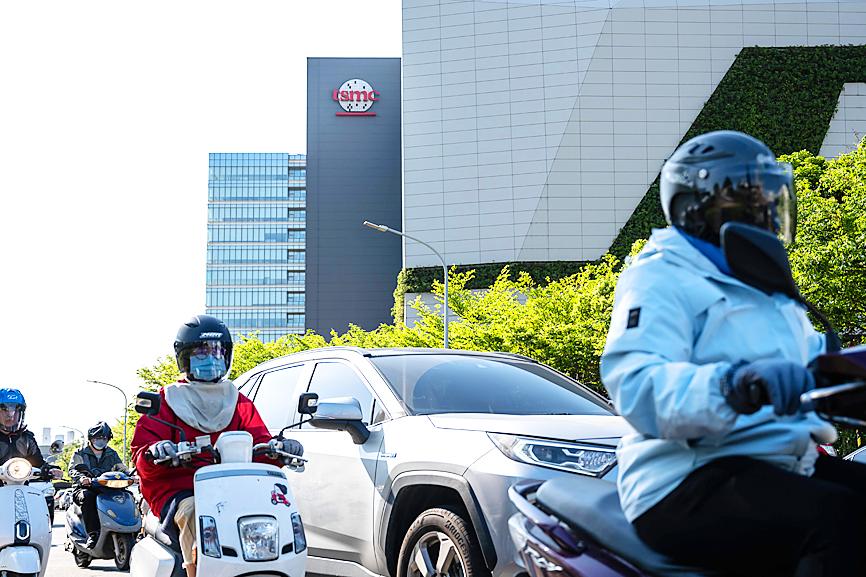Taiwan Semiconductor Manufacturing Co (TSMC, 台積電) yesterday reported a third straight quarter of record sales, underscoring its lead as the world’s No. 1 maker of advanced chips, which are in short supply.
Taiwan’s largest company said that first-quarter revenue climbed 16.7 percent to NT$362.41 billion (US$12.74 billion), compared with the average NT$360.5 billion of analysts’ estimates.
TSMC in the middle of January said that its revenue for the three-month period was expected to range from US$12.7 billion to US$13 billion after the estimate was converted into a range of NT$354.97 billion to NT$363.35, based on the average exchange rate of NT$27.95 at the time.

Photo: Billy H.C. Kwok, Bloomberg
The strong showing in the first quarter came after TSMC smashed its records by posting NT$129.13 billion in sales last month, up 21.2 percent from a month earlier and 13.7 percent from a year earlier.
TSMC has kept its fabs running at “over 100 percent utilization” over the past year, chief executive officer C.C. Wei (魏哲家) told clients in a letter recently.
The company — already planning capital spending of as much as US$28 billion this year — plans to invest US$100 billion over the next three years to expand its capacity, he said.
“TSMC is investing aggressively to capture the structural and fundamental increase in underlying demand driven by long-term growth megatrends from 5G and high-performance computing,” Citigroup Inc analyst Roland Shu (徐振志) wrote in a note.
The spending target implies that TSMC’s revenue could reach as much as US$95.1 billion in 2024 and the firm “is on the march to be the largest semiconductor company by revenue in 2024-2025,” Shu said.
TSMC has scheduled an investors’ conference on Thursday next week to detail its first-quarter results and give guidance for the second quarter, as well as for the whole of this year.
Analysts said that the company’s sales growth momentum would continue with production capacity fully utilized.
As Taiwan faces a serious water shortage, analysts said that the market wants to know how the lack of water would affect TSMC’s operating costs.
Like other tech firms, TSMC has begun buying water by the truckload to meet demand.
Additional reporting by CNA

TAKING STOCK: A Taiwanese cookware firm in Vietnam urged customers to assess inventory or place orders early so shipments can reach the US while tariffs are paused Taiwanese businesses in Vietnam are exploring alternatives after the White House imposed a 46 percent import duty on Vietnamese goods, following US President Donald Trump’s announcement of “reciprocal” tariffs on the US’ trading partners. Lo Shih-liang (羅世良), chairman of Brico Industry Co (裕茂工業), a Taiwanese company that manufactures cast iron cookware and stove components in Vietnam, said that more than 40 percent of his business was tied to the US market, describing the constant US policy shifts as an emotional roller coaster. “I work during the day and stay up all night watching the news. I’ve been following US news until 3am

UNCERTAINTY: Innolux activated a stringent supply chain management mechanism, as it did during the COVID-19 pandemic, to ensure optimal inventory levels for customers Flat-panel display makers AUO Corp (友達) and Innolux Corp (群創) yesterday said that about 12 to 20 percent of their display business is at risk of potential US tariffs and that they would relocate production or shipment destinations to mitigate the levies’ effects. US tariffs would have a direct impact of US$200 million on AUO’s revenue, company chairman Paul Peng (彭雙浪) told reporters on the sidelines of the Touch Taiwan trade show in Taipei yesterday. That would make up about 12 percent of the company’s overall revenue. To cope with the tariff uncertainty, AUO plans to allocate its production to manufacturing facilities in

Six years ago, LVMH’s billionaire CEO Bernard Arnault and US President Donald Trump cut the blue ribbon on a factory in rural Texas that would make designer handbags for Louis Vuitton, one of the world’s best-known luxury brands. However, since the high-profile opening, the factory has faced a host of problems limiting production, 11 former Louis Vuitton employees said. The site has consistently ranked among the worst-performing for Louis Vuitton globally, “significantly” underperforming other facilities, said three former Louis Vuitton workers and a senior industry source, who cited internal rankings shared with staff. The plant’s problems — which have not

TARIFF CONCERNS: The chipmaker cited global uncertainty from US tariffs and a weakening economic outlook, but said its Singapore expansion remains on track Vanguard International Semiconductor Corp (世界先進), a foundry service provider specializing in producing power management and display driver chips, yesterday withdrew its full-year revenue projection of moderate growth for this year, as escalating US tariff tensions raised uncertainty and concern about a potential economic recession. The Hsinchu-based chipmaker in February said revenues this year would grow mildly from last year based on improving supply chain inventory levels and market demand. At the time, it also anticipated gradual quarter revenue growth. However, the US’ sweeping tariff policy has upended the industry’s supply chains and weakened economic prospects for the world economy, it said. “Now